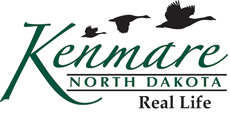Kenmare ND - Features
Real People. Real Jobs. Real Adventures.
Thanks for reading some of the latest features about area people and events.
To view every page and read every word of The Kenmare News each week,
subscribe to our ONLINE EDITION!
Women, children and men can fall victim to domestic violence
10/06/10 (Wed)
Nobody likes to talk about it or admit that even in a relatively safe place like
However, the numbers don’t lie and they’ve stayed fairly consistent over the past few years, according to Deanna Cleveland, assistant director for the
“The reality is, we see all income levels who request our services,” she said. “We see all ages and races. There really is no discrimination with violence.”
In 2009, the Center made 1,519 client contacts, with 98 percent of those contacts from women and almost 2 percent from men.
The Center worked to provide 107 protective orders involving victims and law enforcement officials, and sheltered 113 women and 255 children during the year.
And because the Center offers its services in Ward, Renville, Pierce and McHenry counties, the probability that women, children and even men you know may have contacted the Center is high. In fact, staff members at the Center want small town and rural residents to understand the services are available to everyone in those counties.
Various types
of help available
The North Dakota Council on Abused Women’s Services lists the various forms domestic violence can take against an adult, including pushing or shoving, hitting or slapping, pulling hair, punching or kicking, strangling or restraining by force, tripping, arm-twisting, or using a weapon. Emotional abuse can include intimidation, isolation, using name calling or mind games against the victim, making threats, economic abuse, or using the children to manipulate a situation.
The
Support groups for adults, as well as children, are scheduled by the Center. The children’s groups, open to youth ages 4 through 18, have been especially popular with topics including self esteem issues, safety and appropriate ways to express anger, sadness and other emotions.
For victims thinking about leaving a violent or abusive situation, with or without children,
Those victims who need immediate relief from a violent relationship can call the Center for help and possible sheltering.
While the victims live in a safe house, the Center also refers them to a variety of other services. “We look at social services, job services, whatever they need to regain a sense of independence,” said
Contacts remain private
Confidentiality for each situation remains a top priority with the Center, including their outreach staff who see clients in the outlying counties. “If we need to come to an area and meet with a client, we try to meet somewhere private,”
Where to call for help
Even when the circumstances for a victim of domestic violence seem insurmountable, especially in one of
The ND Council on Abused Women’s Services reports that in one 24-hour period, 283 victims of domestic violence and their children across the state receive assistance from local domestic violence service providers, like the Domestic Violence Crisis Center in Minot. “We wish we could work ourselves out of a job,”
For more information about services provided by the
The office also maintains a website at www.minot.com/dvcc and can be contacted by email at dvcc@minot.com.
The 24-hour crisis line can be reached at 857-2200, and the rape crisis line at 857-2500.
Further information about services to assist domestic violence victims and their families can also be found at the North Dakota Council on Abused Women’s Services website at www.ndcaws.org.

